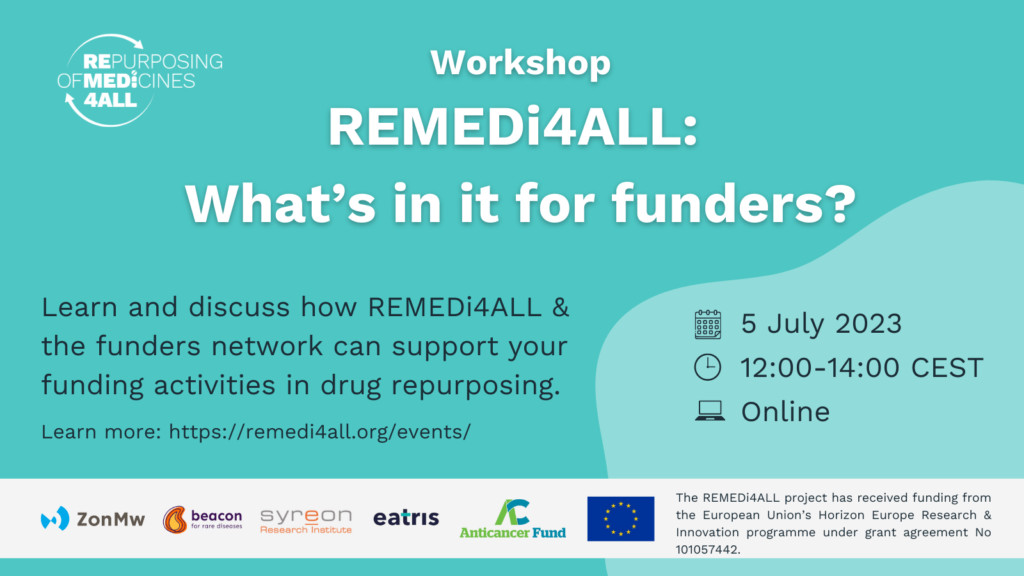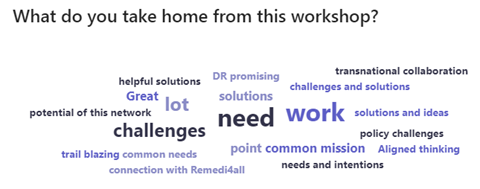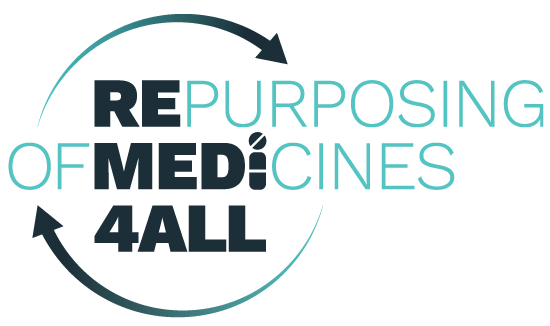Over 50 representatives from (non-) governmental funders, philanthropies and pharmaceutical companies from around the world (Europe, Australia and USA) joined REMEDi4ALL’s first funders workshop online in July 2023.
What are the most common barriers to funding high-impact drug repurposing research? What assessment criteria and tools should be used to inform “wise” funding decisions? What critical incentives and solutions should be explored?
REMEDi4ALL’s first funders workshop on 5 July 2023 discussed these important questions with over 50 funders’ representatives from (non-) governmental funders, philanthropies and pharmaceutical companies who took part in this interactive online event. This workshop was the first gathering of funders who are active or interested in drug repurposing and a starting point for the REMEDi4ALL funders network that will be shaped within the coming months.

The workshop was organised by ZonMw (Dutch governmental health research funder) in collaboration with EATRIS (European infrastructure for translational medicine), BEACON: for rare diseases (Patient advocate in rare diseases), Syreon Research Institute (Expert in health policy and health economics) and the Anticancer Fund (European not-for-profit research foundation). These organisations are all part of the REMEDi4ALL consortium, led by EATRIS.
The workshop started with a warm welcome and introduction by the chair Heleen van der Meer (ZonMw), followed by informative presentations and a panel discussion. The full agenda and slides (including results of live polls) are available here.
REMEDi4ALL
Anton Ussi (EATRIS) introduced the purpose and work plan of REMEDi4ALL, an EU-funded research initiative, launched in September 2022, to drive forward the repurposing of medicines in Europe. In five years’ time, the REMEDi4ALL consortium (consisting of 24 European partners) is building a complete, standardised and accessible platform served by experts in all facets of the medicine repurposing journey and creating a think-tank that develops and advances drug repurposing policy. Via the repurposing concierge, anybody with a repurposing project under development can already request support.
Question from the audience: ‘How are registration and reimbursement authorities involved in the project?’
Answer from Anton Ussi: ‘We have several reimbursement agencies on the REMEDi4ALL Policy Board, and one of our first policy challenges to be addressed is the lack of reimbursement model for repurposed generic medicines. We also have the generics industry in the project so that we can match great projects to companies that will be willing to put the new indication onto label. We see going on-label as the best solution for the system overall, particularly in terms of broad patient access and safety monitoring. There may be exceptions, though, when off-label is the only viable route to patient access. Finally, we also have national competent authorities engaged (BfArM is a project participant), as well as EMA.’
Question from the audience: ‘Do you measure success rates?’
Answer from Anton Ussi: We certainly will but the problem is a full end-to-end trajectory will go beyond the lifetime of our involvement. The number of projects we take to market implementation may be limited. Maybe 10 years from now we will have enough data to see if have had a measurable impact, but the problem is understanding what our baseline is. So what is the success rate right now for repurposing projects. […] So the success rates is probably the last measure that we will be able to see. I think failing better and faster and cheaper is probably where we will have the biggest impact in the beginning.’
Question from the audience: ‘If you’re not in it for 10 years or more, for how long are you?’
Answer from Anton Ussi: ‘REMEDi4ALL is still in the designing process. REMEDi4ALL is a development partner that aims to bring the rigour and robustness of industrial processes into the academic process. The main purpose of REMEDi4ALL is to get projects from end to end, but that does not mean that REMEDi4ALL needs to be involved the whole way.’ Donald Lo (EATRIS) adds: ‘If you consider the goal of really transforming the entire ecosystem, facilitating the entire ecosystem to work better, our best case scenario would be to improve also the collaboration between the academic and the non-profit and commercial sectors. REMEDi4ALL can have a catalytic role in getting repurposed drugs to patients by getting a project to the next stage, or simply get to the stage where there may be a business model or commercial partner maybe who will take it the rest of the way.’
Funders Network
ZonMw is establishing a funders network dedicated to advancing drug repurposing initiatives. All funders who are active or interested in drug repurposing are invited to join. Heleen van der Meer (ZonMw) explained that the funders network can act as a marketplace for funders to share best funding practices, learn from each other, and find like-minded funders and (co-) funding opportunities. Furthermore, think tanks will be initiated within the network working on solutions to overcome funding barriers. Learn more about the funders network here.
Training for funders
Rick Thompson (CEO of Beacon for Rare Diseases) presented the training curriculum for the whole drug repurposing ecosystem his team is working on. The core training should help more researchers propose repurposing projects with a chance to reach the market – good for funder impact. His team is also working on designing training dedicated to funders. Via polls, the participating funders expressed high interest and need for different types of trainings, e.g. on regulatory process, patient centricity, real-world evidence, patent protection and return on investment. Participants found the best way to target training to the funder’s community is by sharing examples of best funding practices and success.
Funding decision support tool
Marcell Csanadi (Syreon Research Institute) showed how his team is developing a standardised tool that can help funders assess the value of drug repurposing candidates. Participating funders were asked to give their input on the tool via polls – e.g., unmet (medical) need, feasibility and scientific quality were the most important selection criteria mentioned by the funders. Looking at financial and societal return on investment, 20 funders in the room took both into account when selecting a project, 11 preferred societal, 6 preferred financial return on investment and 1 did neither.
Question from the audience: ‘I really love this idea of an assessment tool. I was wondering if different stakeholders are kept in mind for this tool. For example, we have scientific and patient advisory boards that are assessing our projects, rather than we are doing it ourselves as a charity fund.’
Answer from Marcell Csanadi: ‘The assessment tool is built to be flexible. Users will be able to switch selection criteria on and off. The assessment tool will be built taking into account the perspectives of different stakeholders.’
Funding drug repurposing: barriers, solutions & incentives needed
Heleen van der Meer (ZonMw) presented insights from 43 online surveys and 20 online interviews held in Q1 2023 among funders regarding barriers in funding drug repurposing, possible solutions and/or incentives needed. Funders experience many different types of barriers (listed in slides 52-59). Solutions and incentives were mentioned from different funding perspectives (slides 60-63) and can be seen as a starting point for further discussion. Heleen emphasised that REMEDi4ALL and the funders network are there to support funders in overcoming the funding barriers and work on (policy) issues together.
A lively panel discussion moderated by Pan Pantziarka (Anticancer Fund) followed, zooming in on where the REMEDi4ALL funders network should focus in terms of solutions to the barriers that were just presented. Three panellists described their own funding perspectives (respectively self-financing medical research charity, pharmaceutical company and governmental funder). They agreed that the biggest barrier was how to get the repurposed drug to the market and patient – ‘Keep the end in mind’. Focus areas that were mentioned included: improving data packages coming out of phase 2, providing (regulatory) scientific advice for research projects to facilitate implementation of the results, and having a clear regulatory pathway and consensus on a fair price for repurposed drugs. During this panel discussion, a think tank was born.
Next steps & closing
As the funders network is being established, you can stay up to date and find out about future meetings by subscribing to the REMEDi4ALL Newsletter. Questions about repurposing projects can already be submitted via the REMEDi4ALL Repurposing Concierge. Most funders (94%) in the room were happy with the online format of the workshop.

Find out more about the funders’ network here.





